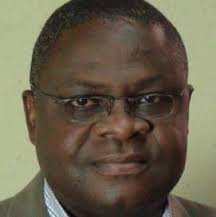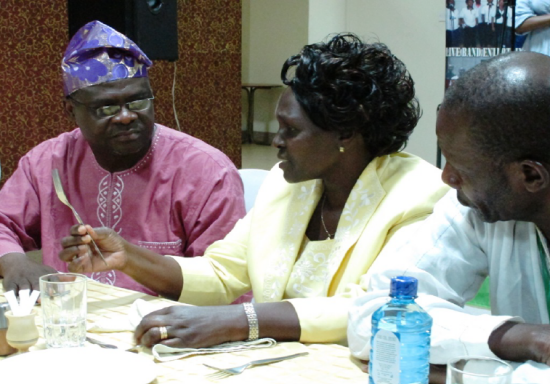With more than three decades in journalism and broadcasting, Diran Onifade, formerly of the Nigerian Television Authority (NTA) spoke with Seye Joseph at the Creating Shared Value Media Workshop organized by Nestle in Lagos. He explained how young journalists can make it in the profession and other crucial issues.
Can you take us through your journey in journalism?
I have been in the media all of my adult life. I joined Radio Nigeria in 1978 which was my eighteenth birthday as a clerk in commercial department. From there, I have engaged in all kinds of activities with broadcast houses in the South West; Radio Lagos; Ogun State Broadcasting Corporation and Radio OYO. After the commercial department was cancelled, I became a studio manager.
From there I went to Ogun State Polytechnic where I studied Mass Communication. After that, I worked with Ogun State Broadcasting Corporation. I was part of the pioneer team that started the Television Services of Oyo State which is now Broadcasting Corporation of Oyo State (BCOS).
I later went to The Polytechnic Ibadan for my Higher National Diploma. During National Youth Service Corps (NYSC), I was with NTA in Abuja. I returned to Lagos after I completed the NYSC programme. I was engaged at Radio Lagos before joining the Nigerian Television Authority (NTA) until 2011 when I resigned.
What do you do now?
Right now, I am an independent media consultant. I just felt tired of doing the same thing over and over again. I thought I could do something on my own. Even most people have thought I would leave for politics — that is possible but that was not what I wanted to do. Some even thought I would get an appointment; I have gotten a series of appointments. What I asked myself was that, how can I live my purpose and meaning to life, that is what I have been doing.
How do you think young journalists can excel in this field?
I always tell young people that if they do journalism very well, it will take care of them. What they just need to do is just to have a goal in life. I felt proficient practising journalism after my HND programme because they gave me technical skills: how to write, what to write, how to speak but with that, I was still not satisfied with what I had and I started looking for all kinds of education. I enrolled for an MBA at Lagos State University (LASU) because I knew I was going to run my business. After that, I did all kinds of all short courses here in Nigeria and abroad. I did a one-year fellowship with Massachusetts Institute of Technology in Science Journalism; I did another fellowship in Kennedy School, Harvard.
Onifade, Vice President, WFSJ Board in Melbourne 2007
Now that you are an independent consultant, are you still relevant in the field as when you were with NTA?
I have tried to improve journalism to the best I can but in a different way. I am not a rat race kind of person so I am not pretending to be who I am, not in order to get somebody’s attention. I left NTA when I should move to the next level in my career. I opted to leave NTA on my own just to do what I am doing here today, and this is what I do all around the world and I do it often. So if I am still there I may not have the privilege to be here today. I am not doing this for free, they will definitely pay me. I don’t go to people for the brown envelope, ask anybody who has been public affairs manager if I ever asked them of a brown envelope. I just do my story and move to the next task.
I can make money from all kinds of skills and exposure I have gotten in life so I am secured. I have not known how to do any other profession apart from journalism. We are not in a profession where you can make money but where you can make what people can do with money. Nobody can push me behind in the profession; I have been to two best Ivy League institutions in the world. I live in a very good place in Abuja in my own house. I am not saying this to boast, as a matter of fact, I don’t know when exactly I have spoken like his before but our colleagues and young people entering the field must know this.
This is the job that has opened doors for me. Some journalists don’t know the value of their identification card which could give them access to enter anywhere. They are busy writing their names to collect N5,000 in the same room where you have Managing Director of Nestle, they are just devaluing themselves. They don’t realize that what they know is power. In fact, if there is a place where someone will corner me somewhere and one Special Adviser on Media will be giving me money, I will leave the place immediately. As a journalist, I’m not in caucus with commissioners; we should not be running after them, they need us more than we need them.
Africa Federation of Science Journalists President Mr. Diran Onifade in a discussion with Prof. Margaret Kamar and Mr Otula Owuor, Science Africa Director during the opening ceremony of the Africa Science Journalist Conference in 2012 (photo: MESHA)
What are the necessary skills journalists should acquire to succeed in the profession?
As a journalist, you need language to understand and you need understanding in order to explain the language. What you don’t understand you cannot explain. It’s very important to improve your language. You do this by reading a lot and converse with people often. You must not take reading for granted. It is not enough for journalists to spend 24 hours on facebook. It is not also enough for journalists to rely on Google for information. As a journalist, you must do beyond anecdote. Anecdotes are for everybody else. When you are in the studio doing your work or writing your piece for the newspaper, anchoring live program – you must be an authority that people must be able to consult for reliable information.
A journalist must be able to observe and have an inquisitive mind. A journalist must be a people watcher. You should also be a media consumer, know what other people are doing, know what other newspapers are writing, know how other people speak and know house styles of media houses. It is not enough to read your paper; in fact some people don’t read their paper. They don’t even read their own story; they only want to check if their story is published. They will get the complimentary copies and send it to the person that owns the story to get stipends. They are only shortchanging themselves.
What story will you say was your best while on the field?
As far as I’m concerned, every story I did in journalism was my best story. All I did was to put my best into any story that I did. When we were doing stories that touch life, you will be seeing the impact of the story immediately the stories go on air. We were doing it with all forms of satisfaction. I don’t believe that one story can change your life with the pace at which things are changing now.




